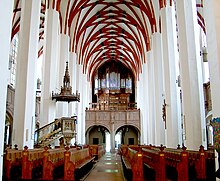Ich lebe, mein Herze, zu deinem Ergötzen, BWV 145
| Ich lebe, mein Herze, zu deinem Ergötzen | |
|---|---|
| BWV 145 | |
| Church cantata by J. S. Bach | |

Thomaskirche, Leipzig
|
|
| Occasion | Third Day of Easter |
| Performed | 1729: Leipzig? |
| Movements | 6 |
| Cantata text | Picander |
| Chorale | |
| Comment | Second movement by Telemann |
| Vocal |
|
| Instrumental |
|
Ich lebe, mein Herze, zu deinem Ergötzen (I live, my heart, for your pleasure),BWV 145, is a church cantata for Easter by Johann Sebastian Bach. He composed it in Leipzig and likely first performed it in 1729.
The cantata is extant only in a later copy. The text of five movements for the Third Day of Easter ("den dritten Osterfesttag") was published in Picander's annual volume of cantatas of 1728, therefore a first performance on 19 April 1729 seems likely.
The prescribed readings for the feast day were from the Acts of the Apostles, the sermon of Paul in Antiochia (), and from the Gospel of Luke, the appearance of Jesus to the Apostles in Jerusalem (). The five movements on Picander's text seem rather short for the purpose, therefore Alfred Dürr suggests that Bach might have added a sinfonia, as in two cantatas of the period, BWV 174 and BWV 188, admitting that there is no source to substantiate it. Instead, in the copy the five Picander movement are preceded by two movements, a four-part of the first stanza of Caspar Neumann's hymn "Auf, mein Herz, des Herren Tag" (ca. 1700), and then the first movement from the cantata TWV 1:1350 by Georg Philipp Telemann, "So du mit deinem Munde bekennest Jesum", a paraphrase of . The beginning of the latter is the title of the copy. The two movements may have been added after Bach's death to make the cantata fit to be performed on Easter Sunday. Picander did not refer to the specific readings for the Third Day of Easter in his text. According to Klaus Hofmann, Carl Philipp Emanuel Bach expanded the cantata by the two additional movements in Hamburg (after 1768) and set the first movement himself. According to Christoph Wolff, the cantata may have been compiled by Carl Friedrich Zelter for the Sing-Akademie zu Berlin. The closing chorale is the fourteenth and final stanza of Nikolaus Herman's Easter hymn "Erschienen ist der herrlich Tag".
...
Wikipedia
